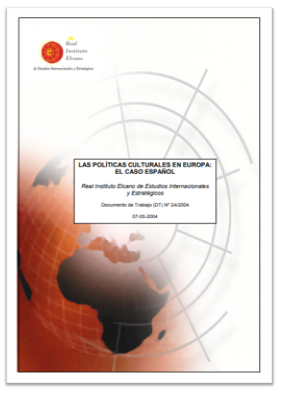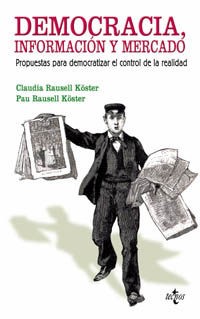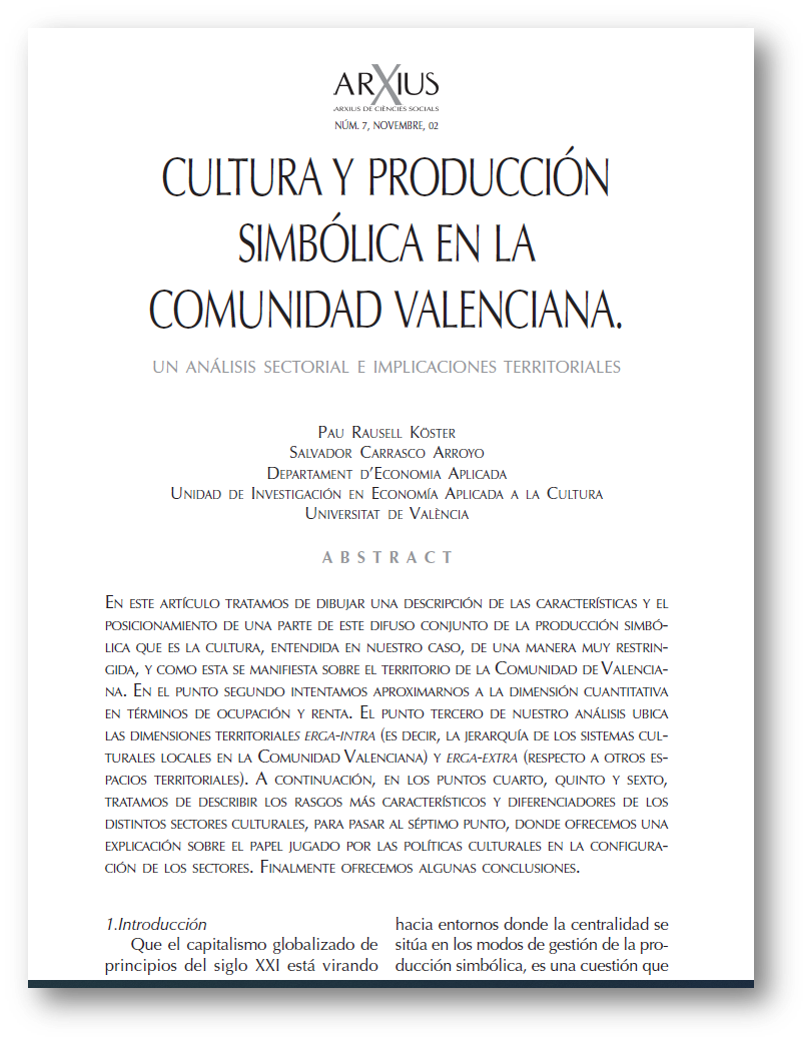-
The underside of culture. Ten years of the economics of culture in Valencia.
Rausell-Köster, Pau
(2004). LlibreAmong Unamuno's most outstanding contributions is the distinction between history and intrahistory. With regard to the former, the intellectual from the Basque Country added little new to what was already known at the time about the temporal expression of the events that had forged the evolution of humanity. Nevertheless, in his reflections on cultural events, synchronic and explicit, he introduced an important subject: the relationship between the small events that make up the culture of a people. This concept of the rector of Salamanca's has been almost forgotten by scholars, even though at the time it was used by some Marxist historians to apply it to their own dialectic of history and...
Among Unamuno's most outstanding contributions is the distinction between history and intrahistory. With regard to the former, the intellectual from the Basque Country added little new to what was already known at the time about the temporal expression of the events that had forged the evolution of humanity. Nevertheless, in his reflections on cultural events, synchronic and explicit, he introduced an important subject: the relationship between the small events that make up the culture of a people. This concept of the rector of Salamanca's has been almost forgotten by scholars, even though at the time it was used by some Marxist historians to apply it to their own dialectic of history and even some others redefined it with a different term, but similar in its content: that of microhistory.
Read more Hide HANDLE: 10550/76606 -
The eco-Museum: Around Sant Jeroni de Cotalbal
Rausell Köster, Pau
(2004). ArticleLa falzia, la veu dels pobles silenciosos.
Since the advent of capitalism and the expansion of the market economy, we have a number of institutions, rules and procedures that determine what can be done with a whole range of resources, artifacts and goods. The institution of private property, based on a whole series of legal corpus and an effective coercive apparatus, allows a natural or legal person to be granted the rights of ownership of a particular good, and this person in the exercise of his or her individual freedom and autonomy and within the space that draws the "legality" can do what he or she wants well; consume it, give it away, sell it. The economic philosophy, already from the famous Mandeville Fable (1670–1733),...
Since the advent of capitalism and the expansion of the market economy, we have a number of institutions, rules and procedures that determine what can be done with a whole range of resources, artifacts and goods. The institution of private property, based on a whole series of legal corpus and an effective coercive apparatus, allows a natural or legal person to be granted the rights of ownership of a particular good, and this person in the exercise of his or her individual freedom and autonomy and within the space that draws the "legality" can do what he or she wants well; consume it, give it away, sell it. The economic philosophy, already from the famous Mandeville Fable (1670–1733), assures us that all pursuing our particular benefit came to the maximum collective benefit (sisi pués cada parte was full of vices, but todo el CONJUNTo was a paraiso), which already takes the "invisible hand" to assign resources appropriately.
Read more Hide HANDLE: 10550/76559 -

Las políticas culturales a Europa: el caso español
Rausell-Köster, Pau
(2004). InformesLes polítiques culturals a Europa: el cas espanyol.
Las primeras intervenciones públicas en la vida cultural, más allá del mecenazgo de la Corona, se inician en España en el siglo XVIII. El espíritu ilustrado que rodea a los monarcas de la nueva dinastía borbónica inspira la puesta en marcha de grandes instituciones culturales (Reales Academias, Biblioteca Real y Teatro Real). Estas iniciativas se enmarcan en el convencimiento ilustrado del papel de la educación y la cultura para promover el progreso económico y social.
Pp. 42
HANDLE: 10550/76561 -
For a new civic contract in cultural policy.
Rausell Köster, Pau
València , 2003. ArticleIn recent decades one of the legitimising arguments of cultural policies has been that culture has become an economic resource, so often in the face of the intrinsic difficulty of debating the relevance, goodness or effectiveness of cultural policies economic discourse becomes the definitive argument that drives them. It is certainly right to attribute to the economic perspective the fact that we are moving away from hermeneutic approaches to culture, which made any social debate impossible outside the enlightened experts and therefore allowed for the clear rationalisation of public intervention in the field of culture.
Pp.9
HANDLE: 10550/76636 -
Network and market
Rausell-Köster, Claudia Rausell-Köster, Pau
València: Nau Llibres , 2003. LlibreRed y mercado. El debate sobre la cultura de la imagen..
The Internet, like the previous technological leaps, has triggered the same social phenomenon, the same proliferation of polemics and found speeches that at the time awoke artifacts such as rail, telegraph or television. The euphoria in the face of what is still a project faces fear again of the unknown. And in all probability, as in previous occasions, the future will not be aligned with the fates of disasters or with the enthusiasm of perfect futures.
Pp. 19
HANDLE: 10550/76560ISBN: 8476426712 -

Democracia, información y mercado. Propuestas para democratizar el control de la realidad.
Rausell Köster, Claudia Rausell Köster, Pau
Madrid: Tecnos , 2003. LlibreIn the wake of the increase in human interest news to the detriment of social interest news, this essay highlights the inadequacy of media information to the communicative needs of the democratic system. It tries to make explicit some of the contradictions between the needs of the democratic system and the outcome of the actual production of information in a market environment. He denounces not only the fact of turning media reality into a soap opera, but also the illegitimacy of the political power currently exercised by the media, and proposes that the information consumer should participate in the conception of the social reality proposed by the media. To this end, he proposes the need...
In the wake of the increase in human interest news to the detriment of social interest news, this essay highlights the inadequacy of media information to the communicative needs of the democratic system. It tries to make explicit some of the contradictions between the needs of the democratic system and the outcome of the actual production of information in a market environment. He denounces not only the fact of turning media reality into a soap opera, but also the illegitimacy of the political power currently exercised by the media, and proposes that the information consumer should participate in the conception of the social reality proposed by the media. To this end, he proposes the need to diversify the range of information on offer and to define news of social interest. Finally, with the arrival of new technologies, he warns of the growing importance of new social mediators and points towards ideological consumption as a possible mode of social participation.
Read more HideISBN: 84-309-3803-6 -

Culture and Symbolic Production in the Valencian Community. A sectoral analysis and territorial implications. .
Rausell-Köster, Pau Carrasco Arroyo. Salvador
(2002). ArticleIn this paper we intend to present a description of the characteristics and the position of a part of this diffuse set of the symbolic production that is “culture”, understood in our case in a very restricted sense, and how it is distributed over the territory of the Valencian Community. In point 2 we try to come closer to the quantitative dimension of the phenomenon in terms of employment and revenues. In point 3 our analysis locates the territorial dimensions erga-intra (that is to say the hierarchy of cultural local systems inside the Valencian Community), and erga extra (with regard to other territorial locations in Spain). Later, in points 4, 5 and 6 we try to describe the most...
In this paper we intend to present a description of the characteristics and the position of a part of this diffuse set of the symbolic production that is “culture”, understood in our case in a very restricted sense, and how it is distributed over the territory of the Valencian Community. In point 2 we try to come closer to the quantitative dimension of the phenomenon in terms of employment and revenues. In point 3 our analysis locates the territorial dimensions erga-intra (that is to say the hierarchy of cultural local systems inside the Valencian Community), and erga extra (with regard to other territorial locations in Spain). Later, in points 4, 5 and 6 we try to describe the most characteristic features of different cultural sectors in the Valencian Community, to go on to point 7 in which we explain the role played by the cultural policies in the configuration of the above mentioned sectors. Finally we offer some conclusions.
Read more Hide HANDLE: https://hdl.handle.net/10550/76447 -
Language economy.
Rausell-Köster, Pau
(2002). ArticleThat economic science considers language as a subject of study requires at least a brief introduction. It has been customary for some years now for other social sciences, and even the most critical aspects of the economy itself, to accuse the imperialism of the economic paradigm. The economy, rejected, first as a mystical of the contemporary age with the Marxist dissolution, then discredited as a technocratic ointment with the difficulties of Keynesianism, and finally bored by the prosaic miseries of the market, sought new fields of cultivation. Econometrics, health and education economics, game theory, justice and crime economics, ecological economy, family economy, mathematical onanism,...
That economic science considers language as a subject of study requires at least a brief introduction. It has been customary for some years now for other social sciences, and even the most critical aspects of the economy itself, to accuse the imperialism of the economic paradigm. The economy, rejected, first as a mystical of the contemporary age with the Marxist dissolution, then discredited as a technocratic ointment with the difficulties of Keynesianism, and finally bored by the prosaic miseries of the market, sought new fields of cultivation. Econometrics, health and education economics, game theory, justice and crime economics, ecological economy, family economy, mathematical onanism, etc. are some of the forward leaks and some of the impasses where Smith's science ends in disbelief. Two hundred and fifty years have been enough to turn the economy, almost the youngest in the sciences, into a decadent old lady. It did not seem to have dared with the major words of Art, Aesthetics, Culture, Language..., but it has done so (e.g. Frey, 2000; Towse and Khakee, 1992; Mosseto, 1993; Trimarchi, 1993; Bretton, 1999). Perhaps, as economist David Levy says: "Linguistics may be the last of the social sciences to avoid the rational choice approach". However, he himself describes how Adam Smith, more than two centuries ago, interactions between language and economy: [Smith's] argument in Wealth of Nations is that trade and language are two aspects of the same process; humans trade because we have language, nonhumans do not trade because they do not.
Read more HidePp. 15
HANDLE: 10550/76555 -
Network and symbolic production
Rausell-Köster, Claudia Rausell-Köster, Pau
Valencia: Nau llibres , 2002. LlibreEl debate sobre la cultura de la imagen.
We find ourselves in a world that is no more (and no less) than a good cocktail of information and matter. However, the social sciences have not been characterised by their profusion in attending to the implications of this essential division of reality. Sociology is the science that, since Bourdieu's work, has worked most on the concept of symbolic capital. In economics, however, the differentiations between symbolic (or informational) goods and material goods have not proved to be very useful except for some marginal sub-disciplines such as the Economics of Culture, the Economics of Communication or the more recent Netnomics.
Pp. 15
HANDLE: 10550/76556ISBN: 9788476426715 -
New employment opportunities in the culture sector. The experience of the case of the museums of San Juan (Argentina) and the management of Musical Societies in Valencia..
Arredondo, Jorge Rausell-Köster, Pau Carrasco Arroyo, Salvador Fombuena Borràs, Enric
València: INAUCO , 2001. ArticleIt is no secret to note that cultural activities, in western and developed societies, constitute a sector of growing demand with strong implications on the quality of life of citizens, and increasingly, with a greater economic impact in terms of income and employment. Even cultural policy has become another dimension of development strategies. So in Ibero-America is generating a whole process of reflection on the importance of culture and so much cultural policies. Culture generates meaning and significance, and shapes identities. But so is welfare and wealth, and is a dynamizing activity of the economy. In addition, it has a key role in the endogenous development processes, based on the...
It is no secret to note that cultural activities, in western and developed societies, constitute a sector of growing demand with strong implications on the quality of life of citizens, and increasingly, with a greater economic impact in terms of income and employment. Even cultural policy has become another dimension of development strategies. So in Ibero-America is generating a whole process of reflection on the importance of culture and so much cultural policies. Culture generates meaning and significance, and shapes identities. But so is welfare and wealth, and is a dynamizing activity of the economy. In addition, it has a key role in the endogenous development processes, based on the own potentialities of the nations and regions. From this point of view, the culture should not be linked only to the own dynamic markets, but also in a fundamental way, the development policies. Although they are not yet in any case differentiated sectors for accounting purposes (in terms of national accounts), some studies suggest that a generic definition of "culture and leisure" could already account for more than 3 or 4% of GDP in countries such as Spain.
Read more HideNo. 38-39, pp.149-166.
HANDLE: 10550/76445ISSN: 0212-7687









